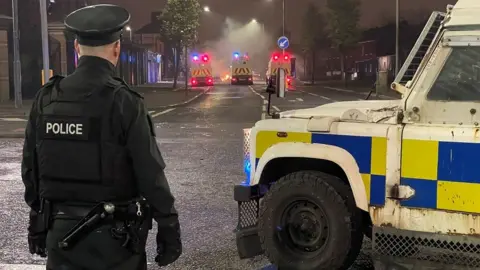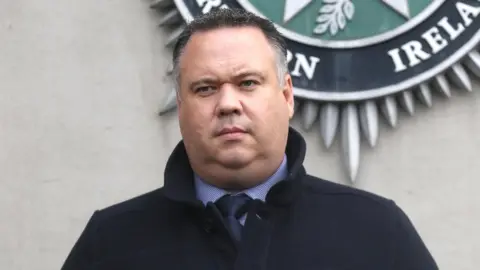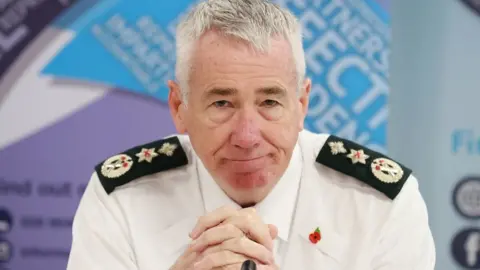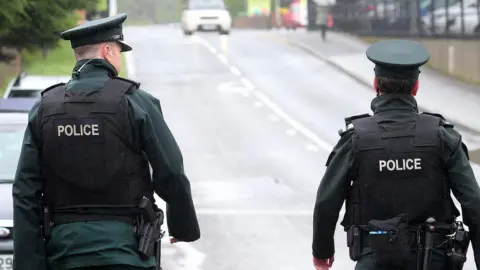PSNI: A year of policing crisis but a steadier ship sails into 2024
 PA Media
PA MediaFor policing, 2023 had the feel of a year of crisis.
A chief constable was forced to resign, budget woes took officer numbers to a record low, and the worst data breach in UK policing history was hugely damaging to staff morale.
The ship has been steadied with Jon Boutcher's appointment.
But he inherited big problems when he became the sixth head of the Police Service of Northern Ireland (PSNI) in November.
To begin with, there is the data breach and its consequences.
In August, the PSNI mistakenly released personal details on its entire 9,500 workforce as part of a Freedom of Information request which was viewable online for more than two hours.
The spreadsheet, containing an individual's surname, initials and place of work, was circulated widely on WhatsApp by some of those who downloaded it.
It didn't take long for it to end up in the hands of dissident republicans, who could potentially use it to target PSNI officers and support staff.
A wave of anxiety mixed with anger washed over the organisation.
Remember, just five months earlier, in March, the terrorism threat level was raised to severe by MI5 after Detective Chief Inspector John Caldwell narrowly survived a New IRA murder bid.
One of the PSNI's most high-profile officers, he was shot multiple times at close range while off-duty coaching junior football at a leisure centre in Omagh in February.
 Pacemaker
PacemakerHis young son was by his side.
Detectives believe the New IRA mounted its boldest attack in years with the help of a crime gang.
So the data breach could not have occurred in any worse an environment for policing.
The impacts are still not fully understood.
As a review of the incident found, it may make recruiting and retaining officers and staff more difficult, as well as choking the flow of intelligence from those fearing it cannot be provided in confidence.
 PA Media
PA MediaThen there is the bill - money the PSNI simply does not have.
This could be in the region of £200m, split between addressing security issues, new data management systems and dealing with at least 4,000 claims for compensation.
Speaking of finances, inflation has eroded the spending power of the £800m budget the PSNI receives annually from the Department of Justice (DoJ).
Cutbacks have been implemented, most noticeably in the form of a recruitment freeze, meaning that officers who retire are not being replaced.
About 60 officers leave every month.
The result is a current officer headcount of about 6,500, the lowest in the PSNI's 22-year history, and unless the financial situation improves, the trajectory downwards will continue in coming years.
What is not helping the situation is that about 1,500 of those officers are either on sickness absence or on restricted duties, due to injury for example, on any given day.
The chief constable has pledged action - to get more officers back to work and to obtain additional financial support by intensifying lobbying of central government in particular.
The Policing Board, amongst others, awaits results.
Neighbourhood policing
The board has a very close eye on neighbourhood policing, where officers are routinely being pulled away from core patrol duties to fill gaps somewhere else.
Neighbourhood policing is a high priority, but it is becoming more and more difficult to protect it from the impact of cuts.
This could emerge as a critical issue for the PSNI in coming months.
 Pacemaker
PacemakerPart of the solution might involve officers dealing with fewer mental health related calls, for example.
There is little doubt Mr Boutcher has lifted morale within the ranks and regained some of the public confidence lost towards the end of the tenure of his predecessor, Simon Byrne.
The Police Federation had abandoned all support for Mr Byrne ahead of his resignation in September, which was triggered by a court ruling related to a Troubles memorial event in Belfast.
It found disciplinary action taken against two officers was influenced by a belief Sinn Féin would withdraw support from policing and was unlawful.
 Liam McBurney
Liam McBurneyFor a period of weeks, the PSNI was in leadership turmoil, with Mr Byrne gone and his deputy Mark Hamilton not returning to work after a medical procedure.
The board did not escape criticism - a review by the DoJ is in the process of being set up - and the absence of a justice minister only added to an air of disarray.
It took a tweak of legislation by the Northern Ireland Secretary to enable the board to appoint Mr Boutcher as an interim chief constable.
Subsequently, following a selection process, he was confirmed in post on a five-year contract.
He knows Northern Ireland and its politics in a way Mr Byrne never appeared to be able to get a firm handle on.
For six years until his appointment, Mr Boutcher had been head of Operation Kenova, an historical investigations unit looking at the activities of an Army agent in the IRA known as Stakeknife.
He has gone from looking back to looking forward and a new set of challenges.
